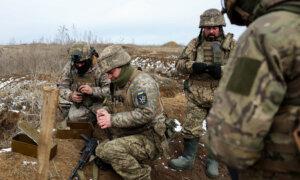‘The United States stands with you. We will not abandon you. We will fight and fight to get this critical aid to you.’
Despite the impasse in the House of Representatives over a $60 billion aid plan, Senate Majority Leader Chuck Schumer (D-N.Y.) is in Ukraine to reassure President Volodymyr Zelenskyy and other leaders that Congress will fund another wave of U.S. aid.
Mr. Schumer led a delegation on Feb. 23 in an announced trip that comes as Ukraine is facing a dangerous situation. Mr. Zelenskyy has said that the Ukrainian military is at grave risk of running out of ammunition and weaponry due to the ongoing conflict and the country’s inability to fend off Russia’s advance on the battlefield.
Congressional representatives from both parties have recently visited Europe to assure their constituents that their country will remain steadfast in its support of Ukraine and other European friends. However, what lies ahead is anything from guaranteed.
Mr. Zelenskyy has said that discussions with international partners are centered on the topic of how to “resume and extend” help.
Sweden, which is on the verge of joining NATO, announced on Tuesday that it will provide Ukraine with military assistance of 7.1 billion kronor, which is equivalent to $681 million. Included are underwater weapons and 30 boats, some of which are military assault ships that are both quick and strong.
In addition, the contract encompasses the acquisition of artillery ammunition, Leopard tanks, shoulder-borne anti-aircraft defense systems, anti-tank missiles, grenade launchers, hand grenades, and medical transport trucks, as well as diving equipment and underwater drones.
On Monday, the government of Canada announced that it will begin sending more than 800 drones to Ukraine beginning as early as this spring. They are a component of the military assistance for Ukraine that was earlier stated to be worth 370 million U.S. dollars (500 million Canadian).
On Tuesday, the Ministry of Finance of Ukraine announced that the country had received $42.5 billion from its international partners in the previous year, of which $11.6 billion was in the form of non-repayable grant aid.
According to the statement, the United States, Japan, Norway, Germany, Spain, Finland, Switzerland, Ireland, Belgium, and Iceland were the countries that contributed to the grant support. The United States, with an $11 billion contribution, provided the largest amount of non-repayable grant funding.
A total of $30.9 billion was allocated for long-term concessional financing. This figure includes loans from the European Union ($19.5 billion), the International Monetary Fund ($4.5 billion), Japan ($3.4 billion), Canada ($1.8 billion), the United Kingdom ($1 billion), the World Bank ($660 million), and Spain ($50 million).
Last week, the Senate approved a $95 billion aid package for Ukraine, Israel, and Taiwan; however, House Speaker Mike Johnson (R-La.) has failed to propose a strategy for the House to approve the measure.
Due to the lack of provisions aimed at securing the southern border, the larger plan was rejected by House Republicans, who considered it unacceptable to ignore the crisis at the U.S. border while paying for the defense of other nations.
As part of the Republican-backed legislation, Ukraine receives $47.69 billion, Israel receives $10.4 billion, the United States and its allies deterrence in the Indo-Pacific receives $4.91 billion. Additionally, U.S. Central Command receives $2.44 billion to be used for measures like dealing with the Houthi threat in the Middle East, and U.S. Indo-Pacific Command receives $542 million.
The Associated Press contributed to this report.
Original News Source Link – Epoch Times
Running For Office? Conservative Campaign Consulting – Election Day Strategies!


